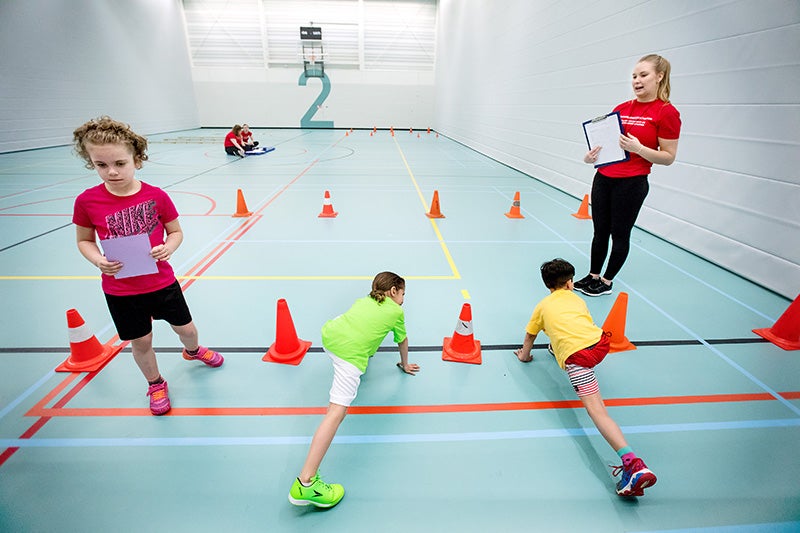Why do some parents find raising a child a lot easier than others? How do expecting parents prepare for parenthood? How do parents deal with challenges, like a crying baby? With these questions in mind, VU education researchers started the Generations2 study with 1,500 pregnant women in 2009. ‘People are pretty good at estimating whether it will be difficult for them or not.’
‘Please be careful!’ One mother anxiously watches on as her child tackles the balance beam, while another actively encourages her child. Some immediately take their child by the hand, whereas others look on from a distance. This is what PhD candidate Lianne van Setten looks at when she asks mothers to accompany and guide their children as they always would.

During sports and game days in the Uilenstede Sport Centre in April, Van Setten invited small groups of children and their mothers for a series of motor and development tests. They have to catch balls, throw bean bags, play hopscotch, jump, and more. This exercise course was developed by sports scientists; the children are a sub-group of the 1500 children whose parents take part in Generations2, a major research project carried out by the Pedagogy department, which has been running for nine years.
Exercise culture in a family
The mothers have participated in the study ever since they were 12 weeks pregnant, so their eldest children are now eight years old. They are regularly asked to complete questionnaires and a sub-group consisting of 300 to 400 parents takes part in more extensive studies, such as the sports and game day. Van Setten: ‘There has been little attention for the relationship between parenting and motor development, although we do have clues that parenting has a major role to play in how children move. We think that a family’s exercise culture is of great importance: do the parents take the bike wherever they go, do they emphasise the importance of exercise, do they encourage their children to carry on when things get hard?
It’s an excellent example of cooperation in the world of science: the motor study in this project resulted from the fusion between the Sports science and Psychology & Pedagogy faculties. Researchers were asked to submit proposals for a fusion project fund, which is what the researchers behind Generations 2did, along with their sports science colleagues.
Traumatic experiences
In addition to the motor study, part of the Generations2 research project focuses on wider social-emotional and cognitive development of children, and the role parents play. The project is headed by educationalists Carlo Schuengel and Mirjan Oosterman. Oosterman shares: ‘Earlier sub-studies in the project focused on the parent-child relationship. Many mothers took part in these studies, including mothers who had been through traumatic experiences in their own youth and mothers who struggled with mental health problems. An important question to ask is how these mothers raise their own children. How is it that mothers with a vulnerable background are still capable of developing a positive relationship with their own children?
Oosterman: ‘We started Generations 2 in order to find out how parents experience parenting and how the parent-child relationship develops. The key question is actually: why is parenting heavy and burdensome for some parents, and the easiest thing in the world for others? A great result we’ve seen so far is that parents’ confidence generally increases in the first year after their child is born, and we’ve also established that parents are pretty good at estimating whether it will be difficult for them or not.’
‘Are you dreading it, or are you full of confidence?’
The researchers asked the pregnant women about their parenting confidence, or how they rated their own competence. Oosterman: ‘Are you dreading it, or are you full of confidence? It turned out that parents with high parenting confidence were actually better at dealing with the challenge of a crying baby. Their mental health was also better: anxiety and depression were more prevalent among parents with low parenting confidence.
Some people escape
You might expect that parents who did not have good role models as a child turn into lesser parents or have less parenting confidence, and that these problems are passed on from one generation to the next. That, however, is not always true. Oosterman: ‘A considerable number of these parents do manage to turn the tide. These people are particularly interesting, because of their resilience.’
The next question, of course, is where do they get their resilience from? And how can you influence parenting confidence? ‘This is a key question when supporting struggling families’, says Oosterman. ‘This gives us more tools to provide proper support to the parents and children that need it.’ The project continues. There is enough funding for the next two years of questionnaires and there’s a very good chance that it will not stop there. Who knows which other creative new sub-studies these researchers will find.






